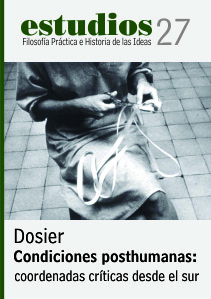Speculative tracing
Keywords:
recursivity, entanglement, perplexity, polyphony, differ, noiseAbstract
My aim in this text is to ask a classic question: what is called thinking? I shall be following the trail of a number of figures in the post-textual scene of theory: recursivity from Marilyn Strahern, entanglement from Donna Haraway, perplexity from Vinciane Despret, polyphony from Anna Tsing, differ from Eduardo Viveiros de Castro, Martin Holbraad and Morten A. Pedersen, and noise from Elizabeth Povinelli. Each of these figures, without any hint of totality, suggests a specific way of understanding the task of thinking. Each of these figures is interrupted by questions that seek to disrupt any semblance of homogeneous continuity. The general aim of the text is simply to create a certain unease about the modes of theoretical practice.
References
Colebrook, C. (2017). We Have Always Been Post-Anthropocene. En Grusin, Richard. (Ed.) Anthropocene feminism, Minneapolis: University of Minnesota Press.
De la Cadena, M. (2015). Uncommoning nature. E-Flux, no 65.
Despret, V. (2021). A la salud de los muertos. Buenos Aires: Cactus.
Giraud, E. H. (2019). What Comes after Entanglement? Durham: Duke University Press.
Haraway, D. (2019). Seguir con el problema. Bilbao: Consonni.
Hui, Yuk. (2022). Recursividad y contingencia. Buenos Aires: Caja Negra.
Kohn, E. (2021). Cómo piensan los bosques. Buenos Aires: Hekht.
Morizot, B. (2020). Tras el rastro animal. Buenos Aires: Isla Desierta.
Povinelli, E. A. (2011). Routes/Worlds. E-Flux, n.o 27.
Povinelli, E. A. (2012). The Will to Be Otherwise/The Effort of Endurance. South Atlantic Quarterly 111 (3): 453-75. https://doi.org/10.1215/00382876-1596236
Stengers, I., y Debaise, D. (2016). L’insistance des possibles. Pour un pragmatisme spéculatif. Multitudes 4 (65).
Stengers, I., y Debaise, D. (2021). Résister à l’amincissement du monde. Multitudes 4 (85).
Strathern, Marilyn. (1992). Reproducing the Future. Manchester: Manchester University Press.
Tsing, A. L. (2023). Los hongos del fin del mundo. Buenos Aires: Caja Negra.
Viveiros de Castro, E., Holbraad, M. y Pedersen, M. A. (2014). The Politics of Ontology: Anthropological Positions. Fieldsights, 2014. https://culanth.org/fieldsights/series/the-politics-of-ontology
Yusoff, K. (2013). Geologic life: prehistory, climate, futures in the Anthropocene. Environment and Planning D: Society and Space 31.
Downloads
Published
Issue
Section
License
Copyright (c) 2024 Emmanuel BisetLicencia CreativeCommons (CC BY-NC-SA 2.5 AR) - creativecommons.org/licenses/by-nc-sa/2.5/ar/
Usted es libre de:
- Compartir — copiar y redistribuir el material en cualquier medio o formato
- Adaptar — remezclar, transformar y construir a partir del material
- La licenciante no puede revocar estas libertades en tanto usted siga los términos de la licencia
Bajo los siguientes términos:
- Atribución — Usted debe dar crédito de manera adecuada , brindar un enlace a la licencia, e indicar si se han realizado cambios . Puede hacerlo en cualquier forma razonable, pero no de forma tal que sugiera que usted o su uso tienen el apoyo de la licenciante.
- NoComercial — Usted no puede hacer uso del material con propósitos comerciales .
- CompartirIgual — Si remezcla, transforma o crea a partir del material, debe distribuir su contribución bajo la la misma licencia del original.
- No hay restricciones adicionales — No puede aplicar términos legales ni medidas tecnológicas que restrinjan legalmente a otras a hacer cualquier uso permitido por la licencia.
Avisos:
No tiene que cumplir con la licencia para elementos del material en el dominio público o cuando su uso esté permitido por una excepción o limitación aplicable.









